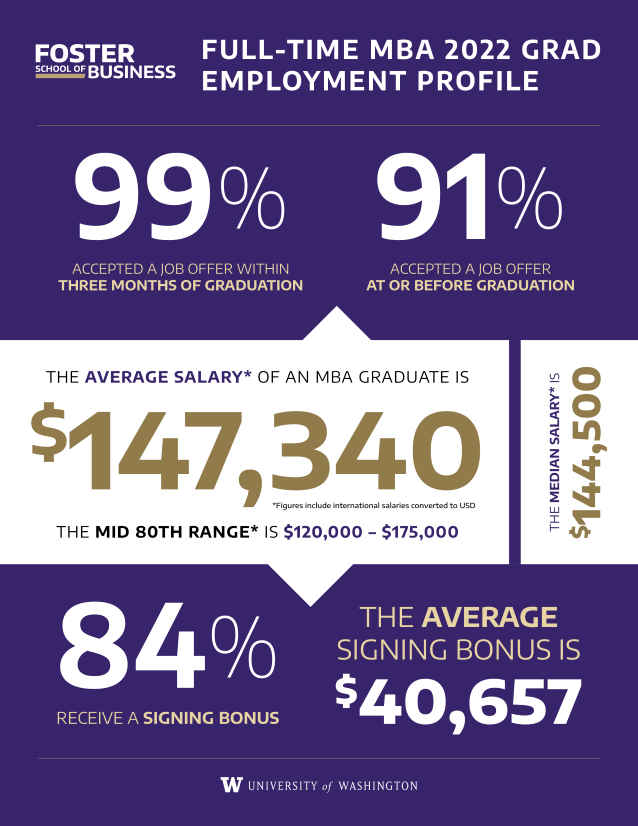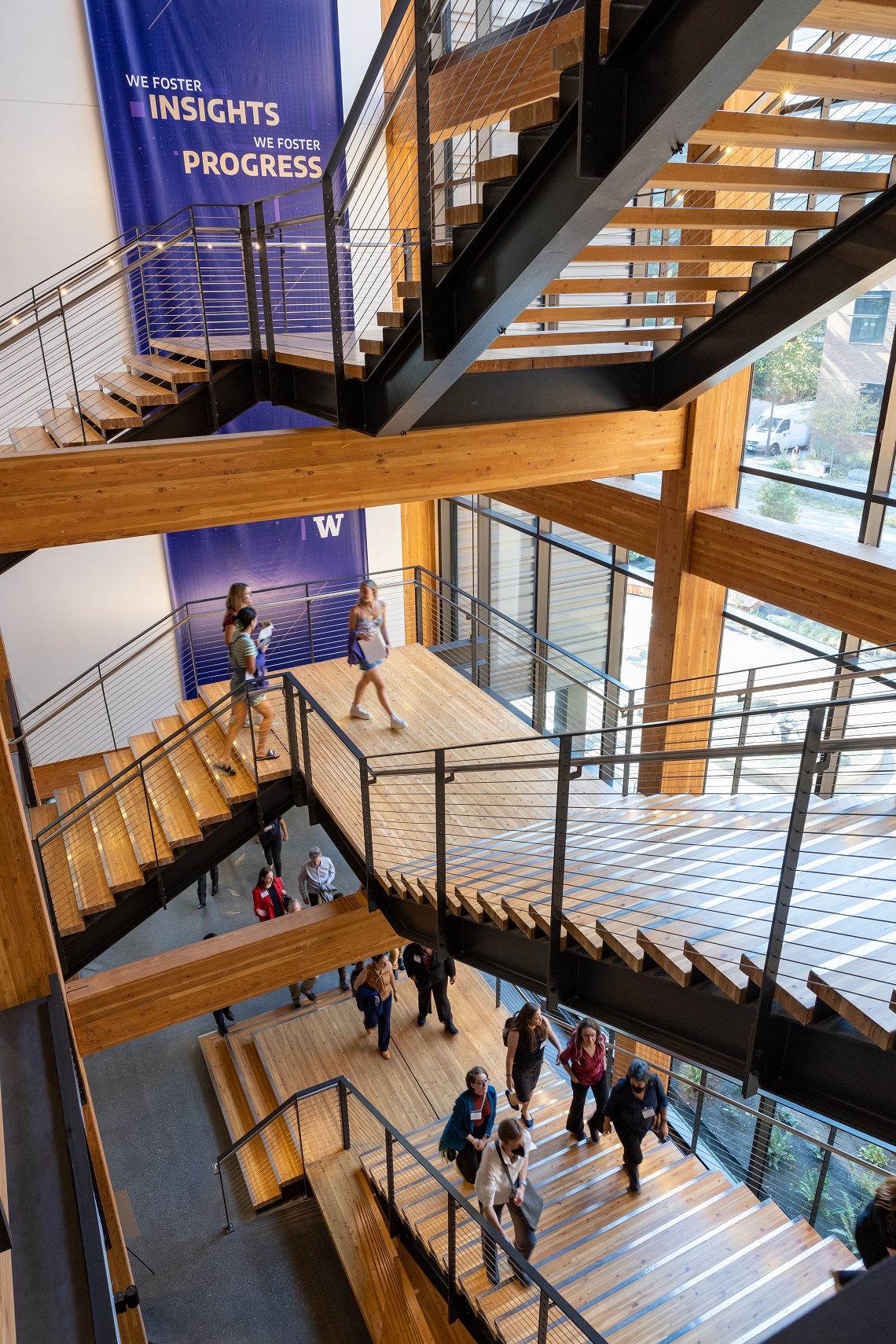5 top reasons to consider an MBA

There are as many unique reasons to get an MBA as there are MBA students. Earning an advanced degree is an investment in oneself, and everyone has their own benchmark for the return on that investment. From landing a new job to mastering a new skill set, here are some of primary reasons students chose to earn an MBA at the Foster School of Business.
1. Advance in your career and raise your salary
An MBA is the most effective means of transitioning from an individual contributor within an organization to management. Across industries, role-specific talent and ability enable everyone from software engineers to data analysts to succeed within their position, but not advance beyond them. An MBA provides training in competitive strategy, global strategic management, and macroeconomics.
The Wall Street Journal reported that “(An MBA) degree can help mid-career individuals parlay expertise in areas such as science or the military into business leadership. It also can help in the transition from the public to the private sector at any age.”
Here is a look at Foster’s Full-time MBA program’s 2022 Graduate Employment Profile.

2. Be a part of a collaborative community
“Everyone is working together,” says Claire Herting (MBA 2021) of her experience at Foster. “Getting to learn from my classmates rather than simply competing with them was huge.” Community is at the core of Foster experience. Students collaborate in an experiential learning environment, bringing real-world challenges to the classroom and teaming to come up with solutions.
 Fellow recent Full-time program graduate Jay Patacsil also says the Foster community was essential to his learning experience. For Patacsil, having mentors and a peer group of fellow industry professionals in the Foster Consulting Society was instrumental in securing his current role at the Boston Consulting Group. “The Foster community is very tight knit,” he says. “At Foster you get to have very real impact on what the curriculum and everyday student experience looks like.”
Fellow recent Full-time program graduate Jay Patacsil also says the Foster community was essential to his learning experience. For Patacsil, having mentors and a peer group of fellow industry professionals in the Foster Consulting Society was instrumental in securing his current role at the Boston Consulting Group. “The Foster community is very tight knit,” he says. “At Foster you get to have very real impact on what the curriculum and everyday student experience looks like.”
Jigesh Parekh is a current Technology Management MBA student and a product manager at Microsoft. He opted to get his MBA for practical reasons, but says it is the relationships he has forged that have been the most impactful.
“I had the technical chops. I know what it takes to make a product,” Parekh says. “But I didn’t always know all the lexicon of the business world. I needed to bridge that gap to have more credibility in the industry. So that’s what drove me to get an MBA. But the crazy thing is that aspect became one of the least important parts of my education. The best part is the community of dedicated and entrepreneurial, like-minded individuals who are helping me unlock my potential.”
3. Make a positive impact on society
The next generation of business leaders know it is incumbent upon them to help address society’s biggest challenges. It is the private sector that has the technology, agility and resources to meaningfully impact the lives people across the globe. The Foster mission statement
Together…
We Foster Leaders
We Foster Insights
We Foster Progress
…To Better Humanity
is woven into the fabric of all classes at Foster. From climate change to social justice, students are committed to improving society through business.
See what it means for Foster to be a purpose-driven school.
Khatsini Simani graduated from Foster with a degree in accounting, and a lucrative career at a big five accounting firm would have been an option. Instead, she demonstrated her commitment to assisting underrepresented communities, and today serves as program director for the Seattle nonprofit Bike Works, which promotes the bicycle as a vehicle for change to empower youth and build resilient communities.

Simani utilizes the skills she learned at Foster to get more young people on and around bikes, promoting cycling as means of physical activity, freedom of mobility, connection and—just as importantly—having fun. She doesn’t view her work as a separate from the business world, but rather a part of the common ties that connect all communities.
“Businesses don’t operate in a vacuum,” she says. “I came out of Foster understanding that it’s not just nonprofit vs. for-profit. We all have to work together with our different values and incentives to try and solve the same problems.”
4. Live and study in a world-class city
Where one chooses to get an MBA is a major decision, necessitating a minimum of one year of study. Individual circumstances and preferences determine how much weight students give to a school’s location. But being in a world-class city is a major draw for many MBA students.

The Foster School of Business is part of the University of Washington, with its campus in Seattle. This provides direct access to the industry-leading companies including Amazon, Microsoft, Alaska Airlines, T-Mobile, Boeing and Starbucks, all of which partner with Foster in a variety of ways, from recruiting and internships to having executives participate in class exercises. Seattle also has a rich cultural scene, with great restaurants, music venues, bookstores throughout the city. Abundant outdoor activities are available all year long, including some of the best hiking opportunities in the country.

Alaska Airlines is one of Foster’s most valued partners. Top executives come to campus for the annual Alaska Airlines Day celebration, a chance for students to network with recruiters, learn more about the aviation industry, and maybe even win a free trip on Alaska Airlines. Similar evets are held with other major companies such as Boeing and Deloitte.
Many of Foster classes are held in the newly built Founder’s Hall, a setting that pays tribute to the Pacific Northwest indigenous community with native art featured prominently and innovative and sustainably-built architecture.
5. Faculty Expertise
The nation’s top business schools are distinguished by the expertise of their faculty Foster Faculty Ranked #8 in the world (averaged over the past five years) for research productivity in the top 50 scholarly journals representing every business discipline, according to the latest Financial Times research index.
A sampling of notable recent Foster faculty research include Professor Weili Ge finding that CEOs who engage in prosocial behavior —activities that primarily help others—are more likely to make decisions that increase company value and Professor Robert Palmatier pinpointing the dos and don’ts of effective influencer marketing.
While research rankings are impressive, prospective students are often more concerned with what’s happening in the classroom. That’s where Foster professors such as Jennifer Koski (Poets & Quants “Favorite Professors of the MBA Class of 2022”) and Elizabeth Umphress (10-time “Star Teacher” honoree) are doing their best work, forging connections with students and inspiring future leaders.
To help determine which MBA program is right for you view our MBA options page
